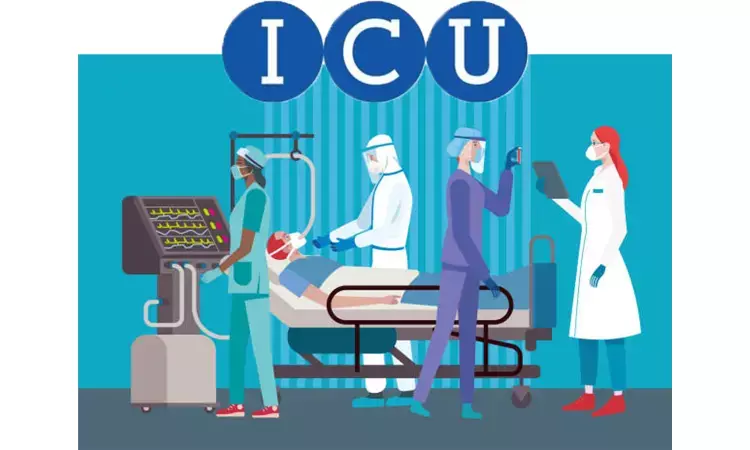- Home
- Medical news & Guidelines
- Anesthesiology
- Cardiology and CTVS
- Critical Care
- Dentistry
- Dermatology
- Diabetes and Endocrinology
- ENT
- Gastroenterology
- Medicine
- Nephrology
- Neurology
- Obstretics-Gynaecology
- Oncology
- Ophthalmology
- Orthopaedics
- Pediatrics-Neonatology
- Psychiatry
- Pulmonology
- Radiology
- Surgery
- Urology
- Laboratory Medicine
- Diet
- Nursing
- Paramedical
- Physiotherapy
- Health news
- Fact Check
- Bone Health Fact Check
- Brain Health Fact Check
- Cancer Related Fact Check
- Child Care Fact Check
- Dental and oral health fact check
- Diabetes and metabolic health fact check
- Diet and Nutrition Fact Check
- Eye and ENT Care Fact Check
- Fitness fact check
- Gut health fact check
- Heart health fact check
- Kidney health fact check
- Medical education fact check
- Men's health fact check
- Respiratory fact check
- Skin and hair care fact check
- Vaccine and Immunization fact check
- Women's health fact check
- AYUSH
- State News
- Andaman and Nicobar Islands
- Andhra Pradesh
- Arunachal Pradesh
- Assam
- Bihar
- Chandigarh
- Chattisgarh
- Dadra and Nagar Haveli
- Daman and Diu
- Delhi
- Goa
- Gujarat
- Haryana
- Himachal Pradesh
- Jammu & Kashmir
- Jharkhand
- Karnataka
- Kerala
- Ladakh
- Lakshadweep
- Madhya Pradesh
- Maharashtra
- Manipur
- Meghalaya
- Mizoram
- Nagaland
- Odisha
- Puducherry
- Punjab
- Rajasthan
- Sikkim
- Tamil Nadu
- Telangana
- Tripura
- Uttar Pradesh
- Uttrakhand
- West Bengal
- Medical Education
- Industry
Aspirin use cuts complications, improves survival in COVID-19, finds study

COVID-19 is associated with hypercoagulability and increased thrombotic risk in critically ill patients. Researchers at the University of Maryland School of Medicine (UMSOM) conducted a study to evaluate whether aspirin use is associated with reduced risk of mechanical ventilation, intensive care unit (ICU) admission, and in-hospital mortality.
"This is a critical finding that needs to be confirmed through a randomized clinical trial," said study leader Jonathan Chow, MD, Assistant Professor of Anesthesiology at UMSOM. "If our finding is confirmed, it would make aspirin the first widely available, over-the-counter medication to reduce mortality in COVID-19 patients."
To conduct the study, Dr. Chow and his colleagues culled through the medical records of 412 COVID-19 patients, age of 55 on average, who were hospitalized over the past few months due to complications of their infection. They were treated at the University of Maryland Medical Center in Baltimore and three other hospitals along the East Coast. About a quarter of the patients were taking a daily low-dose aspirin (usually 81 milligrams) before they were admitted or right after admission to manage their cardiovascular disease.
The researchers found aspirin use was associated with a 44 percent reduction in the risk of being put on a mechanical ventilator, a 43 percent decrease in the risk of ICU admission and - most importantly - a 47 percent decrease in the risk of dying in the hospital compared to those who were not taking aspirin. The patients in the aspirin group did not experience a significant increase in adverse events such as major bleeding while hospitalized.
The researchers controlled for several factors that may have played a role in a patient's prognosis including age, gender, body mass index, race, hypertension and diabetes. They also accounted for heart disease, kidney disease, liver disease and the use of beta blockers to control blood pressure.
COVID-19 infections increase the risk of dangerous blood clots that can form in the heart, lungs, blood vessels and other organs. Complications from blood clots can, in rare cases, cause heart attacks, strokes and multiple organ failure as well as death.
Doctors often recommend a daily low-dose aspirin for patients who have previously had a heart attack or stroke caused by a blood clot to prevent future blood clots. Daily use, however, can increase the risk of major bleeding or peptic ulcer disease.
"We believe that the blood thinning effects of aspirin provides benefits for COVID-19 patients by preventing microclot formation," said study co-author Michael A. Mazzeffi, MD, Associate Professor of Anesthesiology at UMSOM. "Patients diagnosed with COVID-19 may want to consider taking a daily aspirin as long as they check with their doctor first." Those at increased bleeding risk due to chronic kidney disease, for example, or because they regularly use certain medications, like steroids or blood thinners, may not be able to safely take aspirin, he added.
Researchers from Wake Forest School of Medicine, George Washington University School of Medicine, Northeast Georgia Health System, and Walter Reed National Military Medical Center also participated in this study.
"This study adds to the tremendous work our researchers are doing in the School of Medicine to help find new treatments against COVID-19 and save patients' lives," said E. Albert Reece, MD, PhD, MBA, Executive Vice President for Medical Affairs, UM Baltimore, and the John Z. and Akiko K. Bowers Distinguished Professor and Dean, University of Maryland School of Medicine. "While confirmatory studies are needed to prove that aspirin use leads to better outcomes in COVID-19, the evidence thus far suggests that patients may want to discuss with their doctor whether it is safe for them to take aspirin to manage potentially prevent serious complications."
For further reference log on to:
Dr Kamal Kant Kohli-MBBS, DTCD- a chest specialist with more than 30 years of practice and a flair for writing clinical articles, Dr Kamal Kant Kohli joined Medical Dialogues as a Chief Editor of Medical News. Besides writing articles, as an editor, he proofreads and verifies all the medical content published on Medical Dialogues including those coming from journals, studies,medical conferences,guidelines etc. Email: drkohli@medicaldialogues.in. Contact no. 011-43720751


